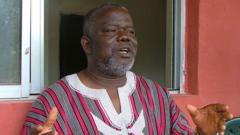Prince Johnson, a key player in Liberia's turbulent past, passed away in Monrovia at 72, but the cause of his death remains undisclosed. His rise to notoriety stems from his role in the two civil wars between 1989 and 2003, particularly for the chilling 1990 footage of him drinking beer while then-President Samuel Doe was tortured by his forces. Despite calls for accountability from the Truth and Reconciliation Commission, Johnson was never prosecuted for war crimes.
Entering politics in 2005, Johnson wielded significant influence, supporting the last three successful presidential candidates, notably Joseph Boakai, who issued a condolence message recognizing Johnson's impact on Liberia's history and political discourse. His supporters regard him as a transformative figure in Nimba County, where he was seen as a liberator.
However, for many, Johnson embodies the specter of unpunished crimes and missed opportunities for justice in Liberia. Human rights activist Adama Dempster lamented that victims were left without closure, as they had hoped to see Johnson face justice for his wartime actions. The civil wars claimed approximately 250,000 lives, with countless survivors suffering permanent scars from violence and sexual assault.
Though he later became a pastor and expressed regret over his past, Johnson’s tenure in politics was not without controversy. He faced sanctions from the United States for purported pay-for-play schemes and was accused of vote manipulation for personal gain. Critics argue that his political maneuvering and alleged unethical actions undermine any transformative work he may have accomplished.
Johnson’s death signifies not only the end of a contentious political chapter but also reignites discussions on Liberia's need for accountability and reconciliation. While some mourn his passing as a loss of leadership, for others, it marks a missed opportunity for confronting the dark chapters of the nation's history fully. The reactions to Johnson’s life reflect the challenges Liberia faces as it continues to deal with the legacy of its civil wars and pursue a path toward genuine healing and justice.





















